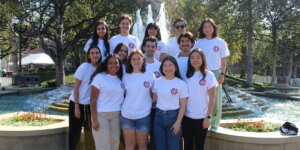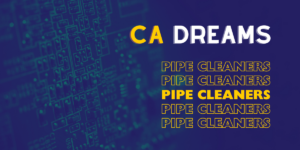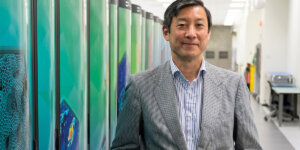
Neil Siegel — an aerospace industry veteran and USC Viterbi Professor of Engineering Practice with Distinction — and his wife, Dr. Robyn Friend, recently established the Neil G. Siegel Professorship in Systems Engineering.
If you’re an industry executive in one of America’s largest corporations, what do you do for an encore?
One possibility: join the faculty of the USC Viterbi School of Engineering.
That’s the idea behind a recent gift from Neil Siegel — an aerospace industry veteran and USC Viterbi Professor of Engineering Practice with Distinction — and his wife, Dr. Robyn Friend, who recently established the Neil G. Siegel Professorship in Systems Engineering.
It’s the second such gift made by a USC Viterbi faculty member in 2024: back in March, Donald L. Paul, another USC Viterbi professor, created the Donald L. Paul Chair in Energy and Technology Management.
The two professor-philanthropists have something else in common: both are former chief technology officers from major corporations. Before his retirement at the end of 2015, Siegel was sector vice-president and chief technology officer with Northrop Grumman/TRW. Paul had been vice-president and CTO with Chevron before joining the USC Viterbi faculty in 2008.
The professorships Siegel and Paul endowed this year are meant to attract engineers like themselves—pioneering inventors and seasoned industry executives, primed for a second career in academe.
Siegel’s professorship will support part of the salary and related expenses of its holder. Like Siegel, candidates must demonstrate long-term experience in practical, large-scale systems engineering in the private sector, and have a proven track-record designing and developing complex societal systems. Their accomplishments must span engineering, technology leadership and entrepreneurship, and they must have received public recognition in the engineering community.
Bridging the gap between industry leadership and faculty appointments delivers key benefits, according to Yannis Yortsos, dean of USC Viterbi. In the classroom, it exposes students to new ways of thinking.
“The expertise that talented and experienced people like Neil and Don bring to USC Viterbi is invaluable,” Yortsos says. “It balances that of typical engineering faculty, who have mostly academic experience.”
A senior faculty pipeline sourced from private industry also promotes better knowledge-creation in USC Viterbi research labs.
“The distance between discovery and application and development is shrinking very fast,” Yortsos explains. “In today’s rapidly changing technology landscape, understanding the impact of research and development outside the strictly academic lens is paramount.”
Yortsos adds: “The establishment of endowed positions like these is key to attracting visionary industry leaders to help guide our students and researchers towards solving important challenging problems with all the realistic constraints being considered.”
A triple Trojan, Siegel earned his bachelor’s and master’s degrees in math, and his Ph.D. in systems engineering at USC. His mother was also a celebrated USC-educated engineer: Judith Love Cohen, B.S. ’57, M.S. ’62 worked on the Minuteman nuclear missile guidance system, the Apollo lunar module guidance system and the science ground station for the Hubble Space Telescope. She was part of the TRW team responsible for the abort guidance system that famously saved the Apollo 13 crew from disaster.
Siegel’s academic career comes after a lifetime of achievement in system design and innovation. He is known for developing many successful military, intelligence and consumer systems, including: the Army’s Blue-Force Tracker; the Army’s first unmanned aerial vehicle; the Forward-Area Air Defense system; and the fire-control segment of the world’s first complete laser weapon system. Siegel has also led projects for the steel industry, the movie industry, the healthcare industry, and the electric power industry. He helped invent techniques to reduce adverse interactions between drugs prescribed by different doctors—strategies now in near-universal use across the United States and Europe. He led the team that created many of the techniques that gave us the wireless version of the internet; these appear in almost every smart phone and tablet computer on the planet.

President Biden awards the National Medal of Technology and Innovation to Neil Gilbert Siegel during an awards ceremony in the East Room of The White House, Oct. 24, 2023. Photo by Ryan K. Morris
For his many achievements, Siegel was awarded the National Medal of Technology and Innovation by President Joe Biden in a 2023 ceremony at the White House. This recognition comes on top of dozens of other awards: election to the National Academy of Engineering and the National Academy of Inventors, winning the premier award in the field of systems engineering (the IEEE Simon Ramo Medal), being selected as a fellow of five professional societies, awards from the U.S. Army, and many others.
As an inventor, Siegel holds nearly 50 patents worldwide. As an executive, his career with Northrop Grumman/TRW encompassed leadership roles in the company’s Tactical Systems Division and UK subsidiary, and roles as sector vice-president and chief technology officer for both the Mission Systems and Information Systems sectors, managing an annual $600 million research portfolio, and overseeing as many as 12,000 scientists and engineers. He retired at the end of 2015.
“I view engineering as a craft that has a vital role in the world—to create practical benefits for society through the application of technique, technology, art and judgment,” Siegel says. “I find that people who have practiced engineering in a private setting understand this and can best convey how to accomplish it.”
The decision to create a professorship that brings distinguished practitioners into the classroom is driven by a desire “to infuse some of this perspective into USC engineering students,” he says.
At USC, Siegel has continued to lead and innovate. He spearheaded a recent overhaul of the Masters in Engineering Management Program to move it into closer alignment with current industry needs, and he has authored three engineering textbooks. He is a faculty member in the Daniel J. Epstein Department of Industrial and Systems Engineering, with a joint appointment in the Thomas Lord Department of Computer Science.
In addition to being the IBM Professor of Engineering Management, Siegel was recently named Professor of Engineering Practice with Distinction, an honor the Provost’s Office bestows in recognition of “exceptional performance in our full-time teaching faculty.”
“As an accomplished executive and systems engineer in the aerospace industry, Neil brings a perspective to the classroom that students rarely experience,” says Maged Dessouky, chair of the Epstein Department. At a time when the department is undergoing a major growth spurt, he notes, the creation of the Neil G. Siegel Professorship in Systems Engineering cements a pipeline ensuring the steady flow of like-minded talent into USC Viterbi.
Published on December 11th, 2024
Last updated on December 11th, 2024












